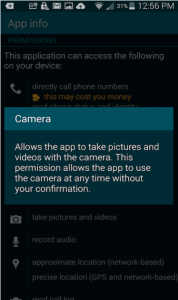Facebook was swamped with criticisms, last week when it started requiring its mobile users to download its Facebook messenger app separately for Android and iOS separate from its basic Facebook app.
Users grumbled about having to use the separate app to send messages, photos or videos to their friends. Other userswere concerned that the Messenger app raised the question of invasion of privacy.
Fretful users claim the app could give Facebook the use of their phones and tablets to take photos and to make phone calls without their specific approval. Users are horrified about the fact that Facebook can access their microphone, camera and contacts through this app. The certainty of how this app uses a device's phone and camera is apparently far less dangerous than many have pictured and assumed it, according to Facebook.
Facebook has responded to its angry users saying that the "permissions" language used in the Google Play Store to describe how Messenger functions with a user's phone or camera was written by Android officials and not Facebook, to explain a large range of apps, not just Facebook messenger.
Although the Messenger app is fundamentally the same app as in iOS, there are no permission requests laid out for iOS users as there are for Android-based Messenger app. As a result, the privacy dangers many users are concerned about isn't that obvious in the iOS version, although some iPhone users are still disturbed about the potential privacy issues.
Facebook posted a statement to users on Aug. 6 which was an attempt by Facebook to clarify how the Messenger app will use five functions of a phone or tablet for taking photos, making calls and more. The post stated "Keep in in mind that Android controls the way the permissions are named, and the way they're named doesn't necessarily reflect the way the Messenger app and other apps use them".
Here's how Facebook Messenger app uses various functions of your Smartphone, with the actual permission that Android requests followed by how Messenger describes its use of each function:
- Take pictures and videos: This permission allows you to take photos and videos within the Messenger app to easily send to your friends and other contacts
Record audio: This permission allows you to send voice messages, make free voice calls, and send videos within Messenger - Directly call phone numbers: This permission allows you to call a Messenger contact by tapping on the person's phone number, found in a menu within your message thread with the person
- Receive text messages (SMS): If you add a phone number to your Messenger account, this allows you to confirm your phone number by finding the confirmation code that we send via text message
- Read your contacts: This permission allows you to add your phone contacts as Messenger contacts if you choose to do so. You can always stop syncing your phone contacts by going to your Messenger settings
Ultimately, the FB Messenger privacy panic is another warning for app users to be aware, as well as to the mobile industry and developers to find new ways to explain users about the permissions for many hundreds of thousands of apps.











